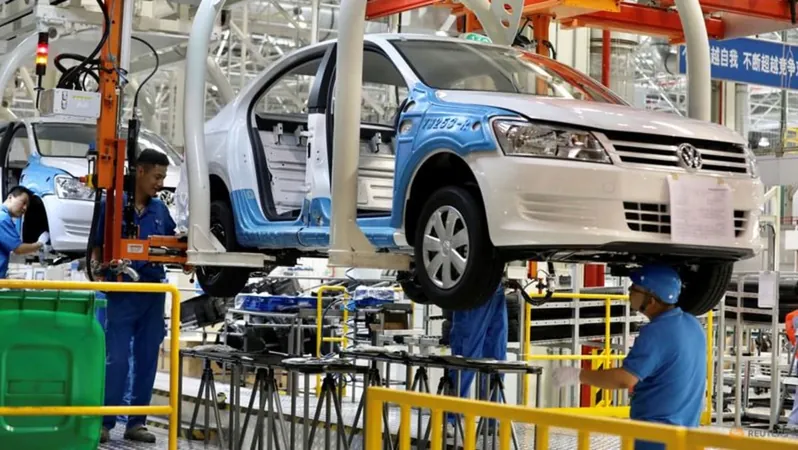
Volkswagen to Exit Controversial Xinjiang Operations Amid Rising Scrutiny
2024-11-27
Author: Rajesh
Volkswagen's Exit from Xinjiang
In a significant move, German automotive giant Volkswagen announced on November 27 that it will divest its operations in China's Xinjiang region, a territory under international scrutiny for alleged human rights violations, including forced labor.
This decision involves the sale of its factory in Urumqi, the region's capital, and a test track located in Turpan, to a Chinese entity, the Shanghai Motor Vehicle Inspection Center (SMVIC). The automaker attributed the decision to "economic reasons," aligning with ongoing efforts to streamline costs amidst increasing competition in the Chinese market.
Volkswagen's Performance in China
Yahoo! News has reported that Volkswagen's sales in China— the automaker’s primary market, generating about a third of its total revenue—are faltering compared to previous years. In 2023, the growth rate slowed significantly, allowing domestic rival BYD to outperform Volkswagen, stripping it of its title as the best-selling brand in the country.
Human Rights Concerns and Market Dynamics
The exit from Xinjiang comes at a critical time for Volkswagen as the company contemplates shuttering factories in Germany, marking a possible shift in strategy amid intensifying competition. Various human rights organizations have long accused Beijing of severe crackdowns on Uyghurs and other Muslim minorities in the Xinjiang region, including allegations of forced labor in state-run detention facilities.
While the Chinese government maintains that its policies in Xinjiang are essential for combating extremism and fostering economic development, global sentiment is increasingly weighing on multinational corporations like Volkswagen.
Public Sentiment Influencing Corporate Decisions
Experts cite public sentiment as a pivotal factor in Volkswagen's withdrawal. Ferdinand Dudenhoeffer, a respected automotive researcher, emphasized that the move signals a response to rising activism and pressure from both public opinion and investors in Berlin.
However, Dudenhoeffer acknowledged the potential backlash within China, where the decision could further jeopardize the already dwindling market share of German automakers.
Influence of Government and Market Forces
Coverage in top German tabloid Bild suggests that the decision was influenced by pressure from the German government and market forces, reflecting a growing intolerance for companies disregarding human rights issues.
Critics argue that Volkswagen had too long overlooked the troubling situation in Xinjiang, where reports indicate over one million Uyghurs and other minorities are detained in facilities criticized for systemic abuse—including torture, forced labor, and severe human rights violations uncovered in various international reports.
Comparative Industry Actions
This move by Volkswagen follows similar actions by other multinational companies, such as the recent exit of German chemical giant BASF from its joint ventures in the region. Conversely, Volkswagen had previously claimed that an external audit found no evidence of forced labor among the 197 employees at its Urumqi plant.
Nevertheless, concerns remain regarding the credibility of data collection in China, and the audit did not cover the Turpan test track.
Conclusion and Broader Implications
The announcement has reignited discussions around the ethical responsibilities of multinational corporations operating in regions with questionable human rights records. As Volkswagen attempts to navigate this complex landscape, it faces the challenge of balancing economic interests with increasing calls for corporate accountability and ethical practices in global supply chains.
As the global conversation continues to evolve, this decision marks a pivotal moment for Volkswagen—reflecting broader trends and tensions in the interplay between business and human rights on an international scale.



 Brasil (PT)
Brasil (PT)
 Canada (EN)
Canada (EN)
 Chile (ES)
Chile (ES)
 España (ES)
España (ES)
 France (FR)
France (FR)
 Hong Kong (EN)
Hong Kong (EN)
 Italia (IT)
Italia (IT)
 日本 (JA)
日本 (JA)
 Magyarország (HU)
Magyarország (HU)
 Norge (NO)
Norge (NO)
 Polska (PL)
Polska (PL)
 Schweiz (DE)
Schweiz (DE)
 Singapore (EN)
Singapore (EN)
 Sverige (SV)
Sverige (SV)
 Suomi (FI)
Suomi (FI)
 Türkiye (TR)
Türkiye (TR)